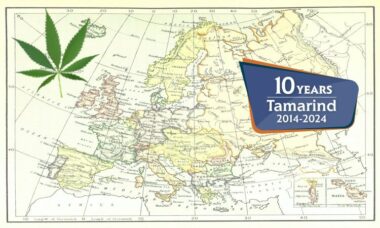 This is part of a series of articles celebrating the tenth anniversary of Tamarind Intelligence.
This is part of a series of articles celebrating the tenth anniversary of Tamarind Intelligence.
The rise of intoxicating hemp-derived cannabinoids (IHDCs) across Europe boosted the profits of companies that took the risk to sell them. At least at first.
While the US experienced a boom in delta-8 THC sales, the main IHDC on the European market has proved to be HHC, mainly due to legal reasons, as narcotic laws in Europe tend to schedule all forms of THC and not just delta-9 THC as they do in the US.
This trend, though, was accompanied by a gradual reaction from authorities, who responded by implementing new regulations and bans we analysed across recent months.
In March this year, the Czech Republic was one of the last European Union member states to ban HHC, bringing to a close a process that was started over a year before. This has been marked by criticism and concerns from a wide section of the cannabis industry in the country, which was once considered Europe’s main market for IHDCs.
The rise and fall of the semi-synthetics market in the Czech Republic, where banned synthetics such as HHC, HHC-acetate (HHC-O) and tetrahydrocannabiforol (THCP) are now broadly perceived as intoxicating and dangerous for young consumers, is the most evident example of a trend CannIntelligence has reported on recently.
CannIntelligence has followed and covered these products in analyses of how regulation has affected cannabinoid markets over the years. Currently, we understand that in Europe HHCs may be legal only in Ukraine, Croatia and Ireland.
A booming online market
IHDC sales were initially able to really take off in Europe and elsewhere with the absence of a clear legal framework.
While many governments were not able to immediately include these substances within the hemp/marijuana dichotomy, which is determined based on the level of THC content, authorities struggled to assess their harmfulness.
Despite that, IHDCs recently ended up being banned by most EU governments, including those that had appeared to be tolerant towards them. While being specifically listed as illegal in some EU countries, though, IHDC-based products, especially HHC ones, became increasingly popular across the continent, where they could be purchased anywhere, at least online.
At the end of last year, CannIntelligence’s analysts found 609 online retailers in the European continent selling IHDCs on the web, with most of them being located in Belgium, Germany and Switzerland.
The number of online retailers, though, slightly decreased through 2023, especially in countries such as France and Austria, where IHDCs were outlawed, while it increased in Bulgaria, Romania, and, outside the EU, in the UK.
Czech online sellers were the most popular, along with their French and Swedish counterparts.
Offline, the IHDC market flourished in a legal limbo in countries where local laws failed to mention HHC and other semi-synthetic cannabinoids as narcotic or psychoactive substances.
Outlawed where they were once tolerated
Until the beginning of 2024, this used to be the case at least with Germany and the Czech Republic, which also stood out as the European countries that moved faster towards the legalisation of recreational cannabis, now partly achieved in Germany.
In several other European countries, including Spain, Portugal, Ireland, the Netherlands, Latvia and Norway, HHC was not specifically banned, but the interpretation of local laws on cannabis and drugs suggested it was most likely illegal.
In a larger number of countries in Europe – namely Italy, France, Belgium, Lithuania, Estonia, Denmark, Iceland, Sweden, Finland, Austria, Slovenia, Slovakia, Hungary, Poland, Bulgaria, Greece and Malta – HHC was illegal.
In recent months, however, the Czech Republic enforced a temporary prohibition of HHC, HHC-O and THCP, which will stay in place until the approval of a bill on psycho-modulatory substances, which is expected before the end of this year.
At the same time, Germany’s government has presented an amendment to the country’s Psychoactive Substances Act, extending it to THC-derived semi-synthetic substances such as HHC and its derivatives (HHC-AC, HHC-H and HHC-P) and notifying it to the European Commission’s TRIS database pending approval by the Federal Council, the German parliament’s higher chamber.
The Czech case
In the Czech Republic the HHC ban was generally not supported by a great part of the cannabis sector, which feared prohibition would fuel the black market. But concerns over the spread of these synthetic substances among young consumers were shared across the industry, especially after a number of teenagers ended up in hospital following intoxication from HHC gummies.
Speaking with CannIntelligence shortly after the HHC ban was enforced, Lukas Hurt, general manager of the Czech Hemp Cluster (CzecHemp), said that following the announcement of the measure, some companies which never entered the synthetic market were experiencing an increase in sales whilst others previously selling HHC had turned to CBD and other non-synthetic cannabis products.
“Businesses who stayed faithful to the cannabis plant and kept selling their CBD oils, never getting into semi-synthetics, are actually saying that their market position is improving now,” he said, “as even before the ban people realised that these [new] substances are not good for them and they went back to the natural plant which is available in the form of cannabis products with less than 1% THC in the Czech Republic.”
A wider threat from the EU
Single-state cases of bans aside, the European IHDC market continues to operate under the threat of a larger wave of prohibitions.
In October 2022, the European Monitoring Centre for Drugs and Drug Addiction (EMCDDA) started evaluating the health risks posed by HHC and other semi-synthetic cannabinoids through its Early Warning System.
In April 2023 the agency published its report on HHC and related substances, which may lead to a process of information exchange with member states that could decide on individual prohibitions.
It’s now a matter of waiting and seeing whether (and how) a new series of bans and restrictions will affect a market that largely operates online or if they will discourage present and future cannabis firms across Europe from dealing with IHDCs.
– Tiziana Cauli CannIntelligence staff
Photo: British Library
Artwork: Christopher Thomas, Wikimedia Commons







